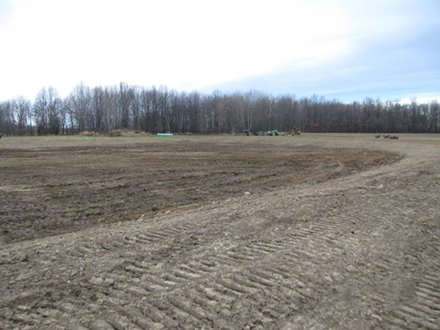Pymatuning construction start

The restoration and enhancement of 639 acres of wetland habitat at the Pymatuning Wildlife Management Area (WMA) wetlands complex, located in western Crawford county Pennsylvania, began this fall. This effort, driven by Ducks Unlimited and the Pennsylvania Game Commission (PGC), aimed to restore and enhance areas of the WMA which are most vital to waterfowl breeding and migration. These improvements are crucial to maintaining the long term habitat stability which migratory waterfowl, waterbirds, and other wildlife depend upon.
Within Pymatuning WMA are some of the largest and most productive wetlands in Pennsylvania. These critical habitats support breeding waterfowl, migratory birds, several endangered, threatened and special concern plant and animal species, and also provide valuable recreational and educational experiences. Prior to the current restoration, many of the aging water control structures on the WMA had become dysfunctional, resulting in the degradation of habitat. The impoundments, which once supported a wide diversity of vegetation and provided excellent forage for waterfowl, had transitioned into open water and were overtaken by spatterdock (Nuphar lutea), with interspersed dense stands of swamp loosestrife (Decodon verticillatus) and cattail (Typha spp.) in the absence of suitable management. These aggressive species were far less valuable to waterfowl, and contributed to a drastic reduction in plant diversity and habitat suitability to wildlife.
Recognizing the importance of Pymatuning WMA to waterfowl populations, Ducks Unlimited worked in cooperation with the PGC to secure funding and support from a wide range of partners: the Wildlife for Everyone Endowment Foundation, the U.S. Fish and Wildlife Service, Reliant Energy, the Richard King Mellon Foundation, and numerous other supporters. Ducks Unlimited used this support to leverage additional funding through a North American Wetland Conservation Act grant and a Pennsylvania State Wildlife grant. Upon final completion this summer, 14.7 acres of palustrine emergent wetlands will be restored and an additional 624.3 acres will be enhanced. Another significant accomplishment for our conservation efforts in Pennsylvania!